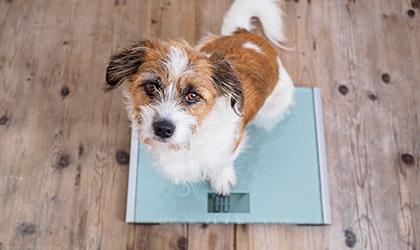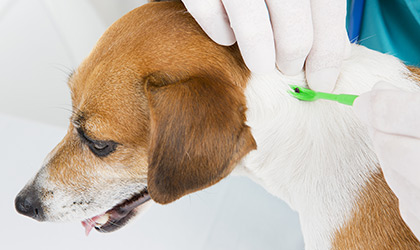
Like us, pets get their fair share of ailments. Though most felines and canines – granted they’re well cared for – aren’t usually struck down by grave illness, health concerns still occur. Prevention is better than cure when it comes to maintaining the overall wellbeing of your furry friend. Consulting your local vet for routine check-ups can also help uncover anything serious before it spirals out of control. Always keep an eye on your pets; they can be ‘masters of disguise’ at times, so you have to spot the tell-tell signs that signal illness.
Skin problems
If your furry friend is incessantly itching, scratching, licking his paws, rubbing his face, and struggling to get any relief, then he’s probably suffering with a spot of skin stress. Fortunately, you can prevent and rectify such problems with the correct application, such as fine-tuning your pet’s diet, grooming regime and even living quarters.
Diet
Newsflash: your little fur ball’s coat provides a useful window into their overall health and wellbeing. A shiny, smooth and silky mane indicates your companion is in ship shape, while flaky, scaly and inflamed fur suggests otherwise. If you suspect a skin condition, diet may be the culprit. You see, your pet’s humble bowl of kibble will affect everything from his paws to his tail – a poor diet will inevitably lead to a poor coat. The solution? A nutrient-dense food regimen, loaded with tons of nourishing goodness and micronutrients.
Above all else, your pet’s coat screams for essential fatty acids (omega 3, 6 & 9) – the compounds that give your furry friends their lustrous glow and handsome sheen. Quality, reputable pet food usually contains adequate levels of these skin-loving compounds, while cheaper varieties tend to perform badly on the essential fatty acid front. Homemade pet food isn’t exempt either. A chicken-heavy diet will be lacking in the omegas too. Bottom line: you need to become an ingredient sleuth when scouting for a ‘complete’ pet food. Always choose products enriched with healthy levels of essential fatty acids, along with other nourishing nutrients like vitamin A, biotin, vitamin E and zinc. Adding a high-strength multi and omega 3 supplement to your pet’s diet will help you achieve peace of mind.
Grooming
Pets’ love being, well, pets’ – playing outside, rolling around in the mud or nose-diving into a lake. It’s part of their irresistible charm, right? While you’d never want to discourage this natural behaviour, such antics can lead to a build up of allergens, pollen and dirt in your pet’s fur. Not only is a matted, bedraggled coat pongy and unhygienic, it’s an invitation for fleas, parasites and other critters to come and nest. Regular grooming of all your pets is needed to keep them clean and fresh. And if your furry friend is blessed with a long, luscious mane, treat him to a regular professional trim. Don’t be temped to do-it-yourself as you could ‘over trim’.
Bathing
Bathing falls into the same remit as grooming; you need to exercise them in tandem to keep your pet’s coats healthy and smelling like roses (or close enough!) Generally, cats don’t need baths (just look at all that time they spend grooming themselves) – it’s our canine companions who require them the most. You should bathe your pooch approximately every 2-3 months, however, this can vary based on breed and lifestyle. Double-coated breeds, such as Labs, only need a good ol’ scrub every 3 months. It’s important not to over wash your hounds either. Just as with humans, excessive shampooing can dehydrate fur and skin, leaving behind a brittle, coarse and rough mane. Did you know your choice of shampoo could spark skin problems for your little fur ball too? If you suspect this, you could start trialling a range of products to see if it improves his condition. Where possible, choose hypoallergenic shampoos that contain natural ingredients.
Essential oils
Itching could be triggered by a flea allergy, which blights cats and dogs alike. If your furry friend is scratching his little heart out, rub some diluted lavender oil (Grapeseed oil works as a brilliant carrier oil) on the problem area. Lavender is the birth right Queen of the essential oil world: it’s multipurpose, full-spectrum and oh-so-versatile. It’s pretty much ‘anti’ anything: anti-fungal, antiseptic, and antibacterial. And though it won’t kill the fleas, lavender will provide some much-needed respite from all the itching. Argh, that’s better. You may be asking yoruself are essential oils really safe to use on our beloved companions?
Living quarters
Sudden changes in your pet’s living environment could also activate skin conditions. While air conditioning and heating may physically stress your furry friend’s coat, a change in household dynamics (a new family member or pet, for instance) could emotionally stress your little fur ball, and subsequently affect his skin. Have you ever been stressed to the point your skin breaks out in spots? Well, much the same happens with your four-pawed companions. To prevent this, try reducing all forms of stress in your household. Perhaps you could create a ‘chill out’ area for your pets – a safe-space that’s free from any anxiety-inducing stimuli?
Obesity
As a nation, we’re getting larger…and so are our pets. In fact, obesity is the fastest growing health concern in the domestic animal world; a staggering 60% are obese in the UK. If your pet packs on the pounds, it could spark a host of other serious comorbidities like heart disease, diabetes, arthritis, and high blood pressure. Thankfully, making simple, savvy lifestyle changes can prevent and usually reverse pet obesity.
Diet
Use the pet food packaging to guide your portion size – and if you have any questions about specifics, discuss them with your vet. Be mindful that dry food is loaded with calories, so you may want to opt for canned food instead to keep your beloved companion trim. Top tip: add a high-strength multivitamin to your pet’s diet to ensure he receives all the essential nutrients needed to support his weight loss journey.
Avoid unhealthy titbits
Unhealthy snacks are a big no-no for your furry friends – yep, even that innocent morsel of cheese. If you are going to indulge them, ensure it’s with something healthy, at least. Freeze-dried liver or lung are pretty good options. Make sure that eager children and visitors refrain from feeding your hungry pets too. Ultimately, as a responsible owner, you need to resist those soulful, adorable eyes.
Exercise
Exercising your pooch needs to be more than just a casual stroll around the block. If you want your canine to lose weight and maintain it, you need to get them moving. Try setting a pace of 15 minute per mile, and avoid sniffing and marking breaks – this will only slow you down. As for cats, try playing with them for 10 minutes each day. Use a dangler rod teaser toy to encourage kitty to dart, jump and pounce about – exploit his predatory nature to get him exercising.
Joint problems
Just like humans, pets can suffer from all sorts of nagging aches and pains, with many developing joint problems in old age. The good news is that a low-stress environment, plenty of affection, and supportive care can help your pet feel worlds better.
Diet
You could try adding glucosamine and omega 3 supplements to your furry friend’s diet, as these may offer some respite from any joint discomfort. Above all though, keep your pet slim to alleviate unnecessary joint stress.
Therapy
Acupuncture isn’t just for people – oh no; this painless technique has reported great success in animals suffering with joint problems. And that’s not all; you could even seek help from a professional animal massage therapist to improve your companion’s circulation, flexibility, and sense of wellbeing. Hydrotherapy is something you may want to consider for dogs (cats aren’t big fans of water, as all owners will know!) The buoyancy of the warm water will help to reduce swelling and pressure on joints.
Lifestyle
If your pet’s struggling with joint problems, be sure to adjust his living environment to cater for his needs. Provide soft supportive bedding for his tender joints; use ramps to help a dog get in and out of the car or into a bed; and put down secure rugs to give him enough friction as he walks. Where possible, keep your four-pawed companion warm – damp, cold conditions will only worsen joint issues. Another no-no: don’t throw balls for dogs with sore, achy joints. This will only tempt them to run, putting unnecessary pressure on their problem areas. Controlled exercise is a must, sadly.
Vomiting
More often than not, vomiting is the result of your pet gobbling up something he shouldn’t. One-off instances aren’t usually anything concerning – most pet’s are voracious eating machines, after all. That said, the presence of bile (a yellow-green substance produced in the liver) is a different story. Bile could indicate a manner of serious health implications: bilious vomiting syndrome, ulcers, parasitic infections, pancreatitis, intestinal blockages, or allergies. While sporadic bouts of vomiting are pretty simple to remedy, the frequent occurrence of bile is a red flag, so you may want to get your pet checked out if this is the case.
Diet
If you’re dealing with a straightforward case of vomiting, trying putting your pet on a bland diet to settle his stomach. Plain rice or chicken broth for your dog, or a meat-based baby food for your cat usually does the trick. Proper hydration is key too; try encouraging your little fur ball to lap water from your hand if he’s refusing to drink. Disclaimer: don’t be alarmed if your pet chows down mouthfuls of grass and is subsequently sick. When your furry friend experiences tummy troubles, he may turn to grass as a form of self-medication to cleanse his system. Of course, one of the best ways to prevent cases of vomiting is to provide your pet with a nutrient-dense, well-balanced diet.
Digestive upset
Although it can occur on its own, tummy upset typically accompanies vomiting, unleashing a double whammy of unpleasantness for your pet. The causes of this are akin to vomiting. While infrequent episodes aren’t anything to worry about, on-going tummy upset is more concerning, as it can lead to dehydration.
Diet
As with cases of vomiting, try putting your pet on a bland diet before reaching out to your vet. Again, it’s very important to keep your furry friend properly hydrated. If your pet refuses to drink, place a little water in a dropper and squirt it into his mouth. Be sure to consult your vet if the bottom business persists. Remember, compost bins can be particularly hazardous and lead to upset tummies, so ensure hungry felines and canines don’t have easy access to them; fence it out and keep them out!
Toxicity and poisoning
Dogs and cats are curious creatures, often guided by their insatiable appetites. So, it’s unsurprising to learn they can be vulnerable to toxicity and poisoning. Plants, household items, medications and certain foods can prove to be extremely dangerous to your furry friends.
Substances to avoid
Toxins come in all shapes and sizes, so it’s useful to know exactly what to hide from your inquisitive feline or canine. Onions, garlic, chives, dairy products, alcohol, grapes, raisins, caffeine, chocolate, fat trimmings and bones should be stored far away from peckish pets. Your garden is home to a host of risks too. Compost bins, slug and snail pellets, lilies and crocuses could all prove deadly to your pets if ingested. Regardless of how cautious you are, it is still possible your furry friend could eat something he shouldn’t. As a first-line of defence, you could use an online calculator to establish if your pet has eaten too much chocolate or caffeine, for instance. If, however, you suspect your furry friend has consumed any of the potentially deadly substances mentioned above, call your vet immediately.
Take home message
From joint problems to skin issues, pets can suffer from all sorts of health conditions. Thankfully, you can prevent and manage most of the common ailments from the comfort of your home. If, however, your four-pawed companion does seem ‘off’, don’t ignore it – animals have an intuitive way of warning you about something a little more insidious. When in doubt, always run it past your vet.
References:
-
Animal Health Company. (2017). Common dog health problems & how to treat them. Available online: https://animal-health.co.uk/news/common-dog-health-problems.html
-
Petsci. (2018). The 10 most common canine health problems. Available online: https://petsci.co.uk/health-care/common-canine-health-problems/
-
RSPCA. (2018). Common dog illnesses. Available online: hhttps://www.rspca.org.uk/adviceandwelfare/pets/dogs/health/illnesses
-
RSPCA. (2018). Common cat illnesses. Available online: https://www.rspca.org.uk/adviceandwelfare/pets/cats/health/illnesses



